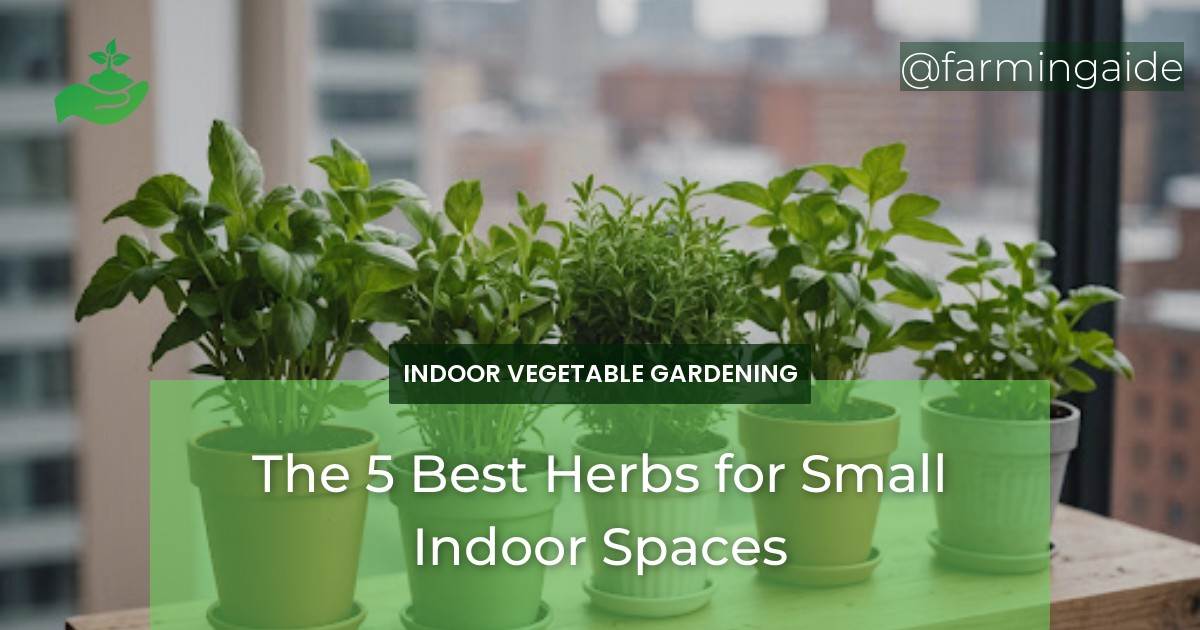Are you tired of sacrificing your love for fresh herbs due to limited indoor space? Look no further! This article will guide you through the world of indoor herb gardening, highlighting the best herbs for small spaces and providing valuable tips for growing and caring for your plants. From choosing the right containers to managing pests, we’ve got you covered.
Key Takeaways
- Discover the top 5 herbs perfect for small indoor spaces
- Learn the benefits and challenges of indoor herb gardening
- Get expert tips on growing and caring for your herbs in compact spaces
- Find solutions to common problems and pests in indoor gardens
- Embrace your inner urban gardener and start growing your own herbs today!
Introduction to Indoor Herb Gardening
Indoor herb gardening is a great way to bring freshness and flavor to your cooking, even in small spaces. With a little creativity and the right herbs, you can enjoy a bountiful harvest from the comfort of your own home. In this article, we’ll delve into the world of indoor herb gardening, exploring the benefits and challenges of growing herbs in small spaces.
Whether you’re a seasoned gardener or a beginner, indoor herb gardening is an excellent way to add some greenery to your home and enjoy the many benefits of fresh herbs. From improved air quality to enhanced flavors, indoor herb gardening is a rewarding hobby that’s easy to start and maintain.
Benefits of Growing Herbs Indoors
Growing herbs indoors offers numerous benefits, including:
- Fresh herbs at your fingertips
- Improved air quality and aesthetics
- Year-round harvesting
- Pest- and disease-free environment
- Customizable and space-efficient
Challenges of Small Space Gardening
While indoor herb gardening is a rewarding hobby, it does come with some challenges, including:
- Limited natural light
- Insufficient air circulation
- Pests and diseases
- Watering and feeding difficulties
- Space constraints
Top 5 Herbs for Compact Spaces
When it comes to indoor herb gardening, not all herbs are created equal. Some herbs thrive in compact spaces, while others require more room to grow. Here are the top 5 herbs perfect for small indoor spaces:
ALSO READ
Basil: The Versatile Favorite
Basil is a popular herb that’s easy to grow indoors and can thrive in compact spaces. With its sweet flavor and aroma, basil is a great addition to many dishes, from pesto to caprese salads.
To grow basil indoors, choose a container with good drainage and provide indirect sunlight. Water regularly, and fertilize with a balanced fertilizer.
Mint: A Refreshing Addition
Mint is another herb that excels in small spaces. This hardy herb can grow in partial shade and requires minimal maintenance. With its cooling flavor and aroma, mint is perfect for teas, cocktails, and desserts.
To grow mint indoors, choose a container with good drainage and provide indirect sunlight. Water regularly, and prune regularly to prevent overgrowth.
ALSO READ
Oregano: The Flavorful Companion
Oregano is a pungent herb that pairs well with many dishes, from pizza to pasta sauces. This low-maintenance herb thrives in compact spaces and requires minimal care.
To grow oregano indoors, choose a container with good drainage and provide indirect sunlight. Water regularly, and prune regularly to promote bushy growth.
Parsley: The Nutritious Herb
Parsley is a nutrient-rich herb that’s easy to grow indoors. With its fresh flavor and aroma, parsley is perfect for salads, soups, and sauces.
To grow parsley indoors, choose a container with good drainage and provide indirect sunlight. Water regularly, and fertilize with a balanced fertilizer.
Thyme: The Space-Saving Option
Thyme is a compact herb that’s perfect for small indoor spaces. With its savory flavor and aroma, thyme is great for soups, stews, and meat dishes.
To grow thyme indoors, choose a container with good drainage and provide indirect sunlight. Water regularly, and prune regularly to promote bushy growth.
Tips for Growing Herbs in Small Spaces
Growing herbs in small spaces requires some special considerations. Here are some expert tips to help you succeed:
Choosing the Right Containers
When choosing containers for your herbs, consider the following:
- Size: Choose containers that are at least 6-8 inches deep and have good drainage.
- Material: Select containers made from breathable materials like terra cotta or ceramic.
- Style: Opt for containers with a wide mouth for easy pruning and harvesting.
Optimal Lighting and Placement
Most herbs require indirect sunlight to thrive. Place your herbs near a sunny window or use grow lights to supplement natural light.
Watering and Feeding Your Herbs
Water your herbs when the top inch of soil feels dry to the touch. Fertilize your herbs regularly with a balanced fertilizer to promote healthy growth.
Common Problems and Solutions
Even with proper care, indoor herb gardens can encounter problems. Here are some common issues and their solutions:
Dealing with Limited Light
If your herbs are not receiving enough natural light, consider using grow lights or moving them to a brighter location.
Managing Pests in Indoor Gardens
Check your herbs regularly for pests like spider mites, mealybugs, and aphids. Isolate infested plants, and treat them with insecticidal soap or neem oil.
Conclusion: Embracing Your Small Space Herb Garden
Indoor herb gardening is a rewarding hobby that can thrive in even the smallest of spaces. By choosing the right herbs and following our expert tips, you can enjoy a bountiful harvest from the comfort of your own home.
Final Tips for Success
Remember to:
- Choose herbs that thrive in compact spaces
- Provide optimal lighting and watering conditions
- Fertilize regularly for healthy growth
- Monitor for pests and diseases
- Enjoy your fresh, flavorful herbs!
Encouragement for Urban Gardeners
Don’t let limited space hold you back from enjoying the benefits of indoor herb gardening. With a little creativity and the right herbs, you can create a thriving indoor garden that brings freshness and flavor to your cooking. Happy gardening!


